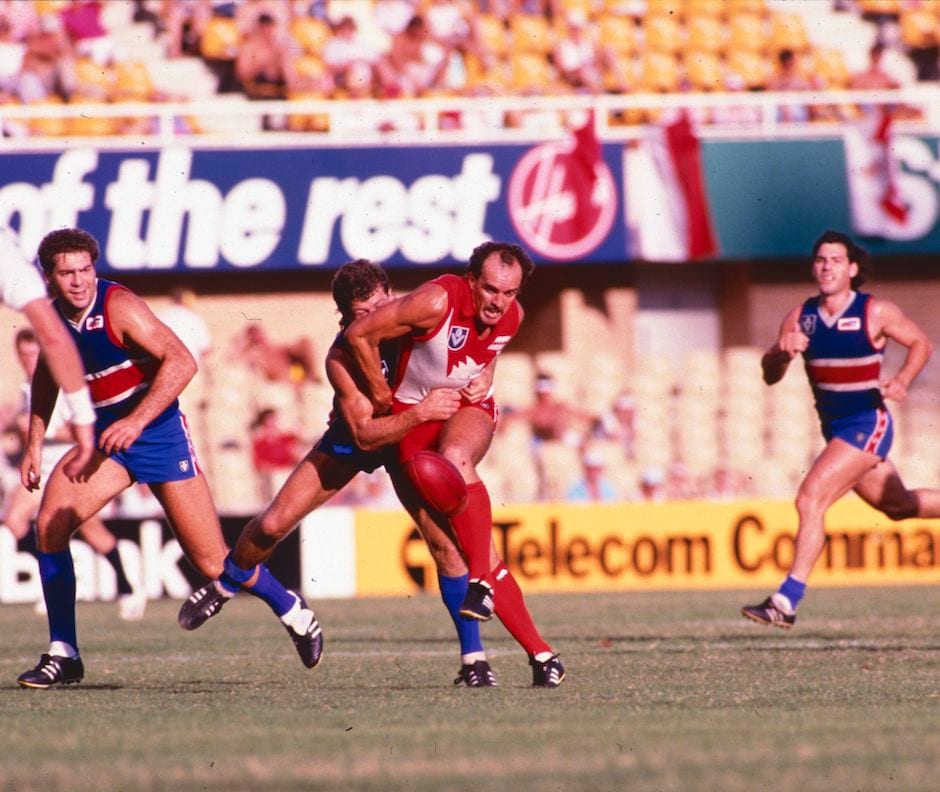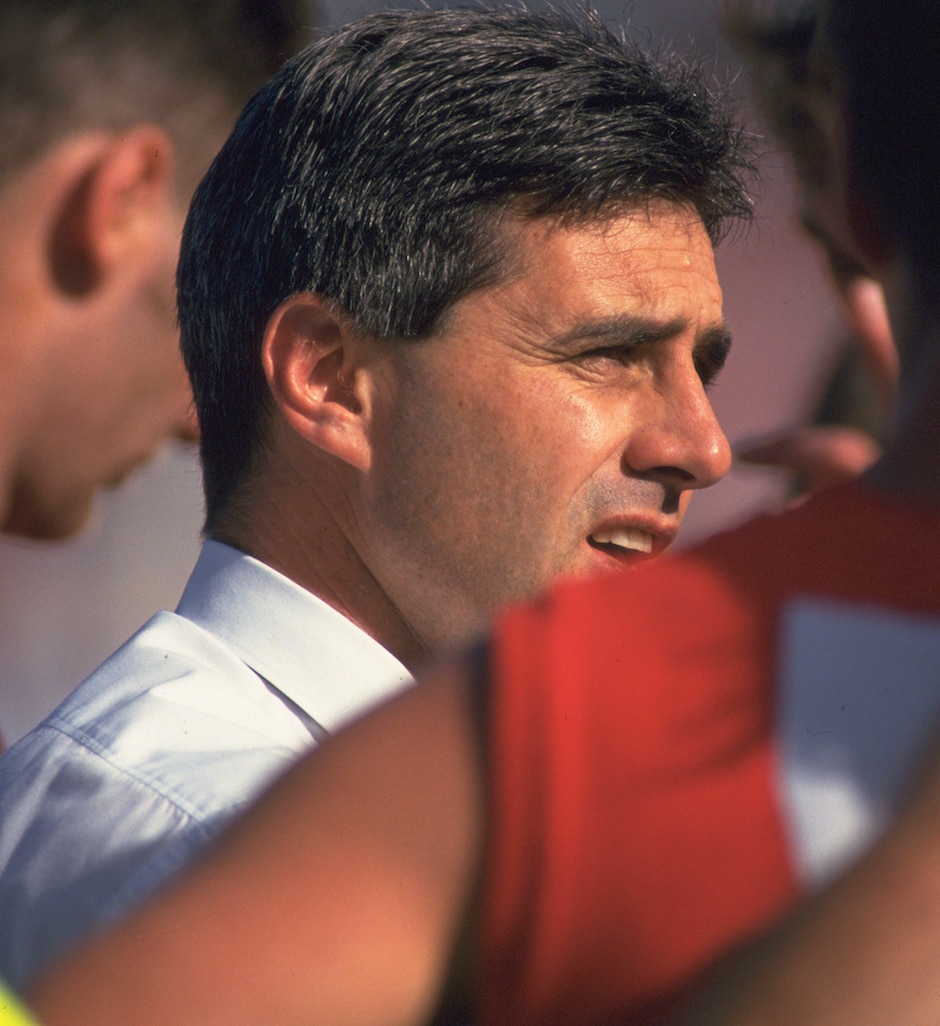In a series new to 2019, we revisit moments in history involving the Sydney Swans’ round-by-round opposition.
History, nostalgia and memories form a special part of what makes Australian rules football great, and we hope the Footy Flashbacks series reignites some of your fondest Swans moments.
In the latest edition, we wind back time to the day Sydney defeated Essendon in a 163-point victory at the SCG in 1987.
The 24,199 supporters who streamed through the SCG gates for the Sydney Swans’ clash with Essendon in Round 17, 1987 would witness one of the finest chapters in the club’s history.
And although 32 years have since passed, those in the SCG stands on the day clearly knew it as the final siren rang throughout the stadium.
Strains of “Sydney, Sydney, Sydney” echoed throughout the Moore Park precinct as the Swans farewelled the crowd to a standing ovation, a 163-point demolition making for scenes to forever be cherished.
The Swans were merciless en route to a 36.20 (236) to 11.7 (73) victory, mounting a score that remains the club’s highest in history and prompting stand-in skipper Mark Browning to deliver an ominous post-match message.

The Sydney Swans limber up for a clash with Footscray at the SCG in Round 2, 1987.
“Our performance today should send more than a few shivers through Hawthorn and Carlton,” Browning told The Sun after taking control of the captaincy for an injured Dennis Carroll.
“I loved every minute of it. It’s not every day you get to savour the feeling of beating Essendon by 25 goals. All the fellas did a marvellous job. We’ve got to be a definite chance now for the flag after today.”
The win lifted the Swans to second on the ladder in the 14-club competition, planting them behind Hawthorn and ahead of Carlton with five regular-season games to play.
The 236-point score now stands as the third-highest of all time behind Geelong’s 239 in 1992 and Fitzroy’s 238 in 1979.
South Melbourne’s 171-point victory over St Kilda at Lake Oval in Round 12, 1919 remains the club’s greatest win, and Sydney’s 1987 triumph over Essendon ranks as the ninth-biggest competition-wide.
But the belting of the Bombers offers just a glimpse of the Swans’ late-season reign of terror.
Only a week earlier they had surged to 201 points to trump West Coast at the SCG, and they’d tally 198 points a week later in a home win over Richmond to lock in eight victories in a row.
Not only are the Swans the only club to have recorded 200 points or more in successive games, no other team has kicked 30 or more goals in three consecutive matches.
Rick Quade, who coached the Swans in the years spanning 1982-1984, hailed the victory at the time as the greatest performance in the club’s history.
The man awarded three Brownlow Medal votes for his stellar performance in the win, former Sydney midfielder Brett Scott, told Swans Media the team was on a charge the opposition could do little to stop.

Sydney Swans enforcer Mark Browning in action against Footscray in Round 2, 1987.
“We just got some momentum and we got some momentum at the right time – over the back end of the game when we were in front,” Scott recalls.
“And when it gets like that it’s just like a steamroller. We got some really good momentum, the crowd was right behind us, everyone was very confident and with that the case the opposition probably dropped back a peg and thought, ‘Well, we’re cooked here’. I’m only going from memory, but the ball was coming out of the centre very, very quickly and quite easily – and that really helps."

Brett Scott addressing his Sydney Swans charges during his one match as coach in 1993.
The Swans led the Bombers by just two points at quarter-time, but they’d storm to 10 goals, eight and 13 over the next three quarters to set up victory.
The catalyst was eight goals in the space of just 14 minutes to start the second term.
Scott would typically only earn a VFL call-up if another on-baller was absent, and the then 25-year-old filled the void of a suspended Greg Williams in just his second appearance of the season.
Scott was sure “there were a lot of eyes on me” as he stepped in for a man who would finish his career as a dual Brownlow Medallist.
But he showed no signs of succumbing to the pressure on his way to 31 possessions and three goals in his best-on-ground display.
Scott, who managed just 59 senior games in an injury-ravaged eight-year career before coaching the Swans in one match in 1993, said he was thrilled with his performance as Williams’ replacement.

Then-Sydney Swans coach Tom Hafey (middle) watches on during the 1987 season.
“It’s really important you get first use out of the centre and it was no different back in those days. With Greg’s dominance in the centre it was really important for myself to ensure I contributed in his absence – and whether it was in the centre or around the ground hopefully I did do that. Greg was one of the dominant players in the competition and it was up to me to keep that momentum going,” Scott said.
“A good personal performance was always very pleasing, but more importantly was the fact that I was back in the side and that I was able to make a contribution to that history-making win. That was the most gratifying thing – that I was able to uphold my end of the bargain. I’m sure there were a lot of eyes on me given I was replacing Greg on the day, and hopefully I did my club proud in the role I played.”
Scott wasn’t willing to deem his sparkling performance against Essendon the best of his career, but he has fond memories of the history-making day.
“It was a great game and it was a historic game for the club. The record is clearly not going to be beaten considering the way the game is played these days. I’m very proud to have been part of it and to have played a reasonable role in the victory,” Scott said.
“It was a historical moment for the club and it’s another historical piece that I can put in my kitbag. Being part of that team that kicked such a big score, and also with making a contribution on the day, makes me feel pretty good when I’m looking back on it.”
While fill-in man Scott led the rampage, a long list of his teammates produced outstanding games of their own.
Tony Morwood gathered 17 disposals and two goals to collect two Brownlow Medal votes, while Stephen Wright snared five goals to register one vote.
The man renowned for his short shorts, eye-catching hairdos, ‘rockstar’ personality and extraordinary football talent, Warwick Capper, blasted six goals from just 11 touches, while Barry Mitchell (38 disposals, three goals) also shone.
And highly acclaimed full-back Rod Carter, who’d retire as a 293-match great and was inducted into the Swans Hall of Fame in 2011, played a crucial role on champion Essendon full-forward Paul Salmon.
The star Bomber had kicked 20 goals over the previous two rounds, but Carter would limit him to just one six-pointer at the SCG.
Scott was in awe of the footballer Carter was.

A young Warwick Capper.
“If Rod was playing on anyone they had to really earn their day’s pay. I can ensure you that Paul Salmon would have gone off the ground disappointed that he’d only kicked one goal, and he certainly would have felt Rod’s body next to his for most of the afternoon,” Scott laughed.
“Rod was one of the most miserly full-backs you could ever play on. I would’ve hated to play on him and I’m sure every full-forward that ever lined up on him never enjoyed their afternoon’s work.”
Scott cannot recall the standing ovation that greeted the Swans as they departed the SCG turf, but he said the fans were enormous on the day.
“The crowd was certainly right behind us,” Scott said.
“Once we got some momentum going the crowd just kept egging us on and I got more confident, the team got more confident and the opposition were getting more and more deflated. The crowd definitely played a big role in us getting some momentum rolling.”

Fans watch on as the Sydney Swans stampede to victory.
Scott debuted in South Melbourne’s clash with Richmond in Round 2, 1981, before rounding out his career as Sydney met West Coast in Round 16, 1989.
The boy from Wagga Wagga has remained in Sydney ever since calling time on his career, and he’s currently working as a supply-chain manager for Max Foods, a privately owned company providing food to the Australian market.
The 57-year-old lives in Warriewood on the city’s northern beaches, and he and his wife Libby are the parents of three children: 26-year-old Mitchell, 23-year-old Georgia and 18-year-old Maddison.
Many moons have passed since he last pulled on the red and white, and even more since his best-on-ground performance in Sydney’s 163-point trouncing of Essendon in 1987.
But Scott, who remains a good friend of Carroll, Carter, David Murphy, Craig Holden, Stephen Taubert, Neil Cordy and a number of other former teammates, says he’ll forever be “a very passionate Swans supporter”.



